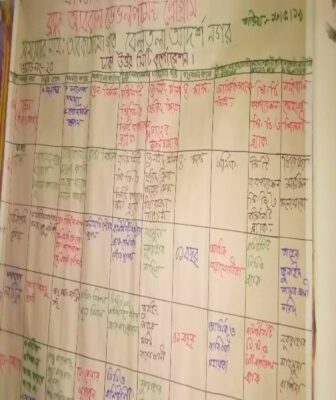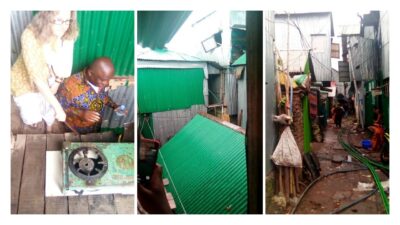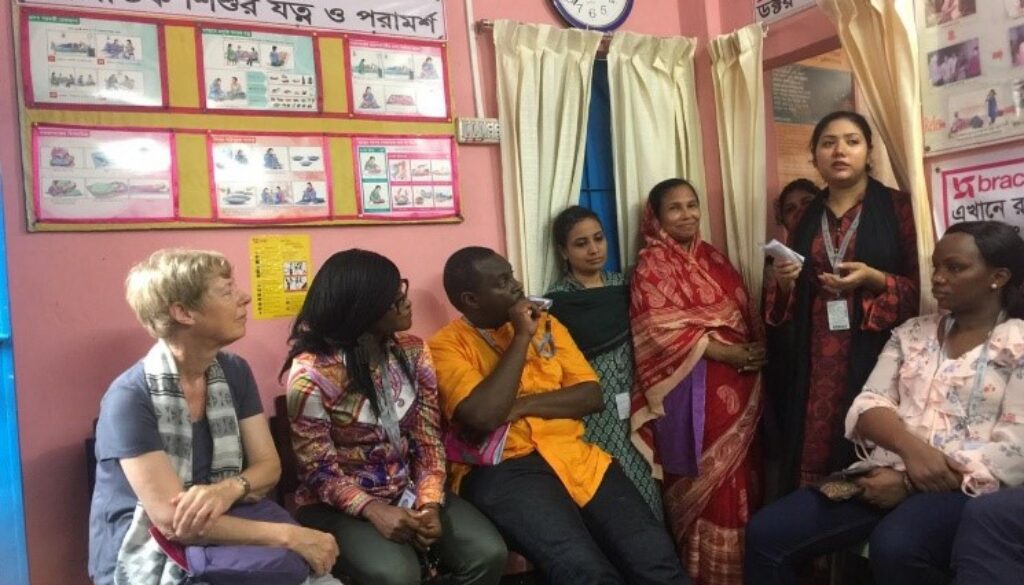Our visit to Korail: A journey in community development
By Samira Sesay
Walking along the narrow spaces in between two, two-storey tin shed houses of the Korail slum in Dhaka, signs of community development were all around us. Korail is the largest slum in Dhaka with over 200,000 households, and about 534 houses.
In December 2016 the community was devasted by a fire that destroyed many houses. But with the help of BRAC Urban Development Program, Disaster Management and Climate Change, residents were able to rebuild households based on a community needs assessment. As we drove through, we realized the new roads were the most striking improvements for easy access to the residents in the slums, in case of any more fires or other emergencies. Measures are now in place for fire prevention, detection and firefighting, as we observed the installation of fire bells, alarms and extinguishers in every household in the community and we also learned that the people were trained on how to use them.
After the tragic event, a project was developed by engaging multi-sectoral partners to create opportunities, improve the well-being of residents and support the realization of rights for the urban poor. We met with the Community Development Organisation and saw their wall display of mapping systems and well being analysis map to enable them to easily identify households or target groups who require assistance. This was a great demonstration of organization and contextual understanding.

The Community Development Organisation helps manage problems through advocacy, learning and empowerment. There are 4500 households per Community Development Organisation and they have supported proper road development and socio-economic work. This is undertaken in partnership with BRAC with the community providing contributions either by cash, kind or by the labour provided. The roads have changed lives in terms of livelihood, sanitation and waste/sewage system, access to health providers and the medical centre.

BRAC Maternity Center in Korail is clean and well maintained and a calm environment. There we were told about the great work of the Community Health Workers and how it is made much easier with the help of trained Community Health Volunteers. These volunteers visit 10 households per day to identify people in need of health services and provide basic care, they give advice to visit the health centers. Encouraging people to take proper health counselling like pregnant women and adolescent girls. Providing personal hygiene packages to encourage proper sanitary measures and husbands are being encouraged to also help remind their wives to not deliver at home. These Community Health Workers expressed so much joy as they shared their achievements. As we spoke with the health workers in the Maternity Center, we asked how they would evaluate their maternal health impacts. In response, they said so far the home deliveries had dropped down to 10% from an initial 85% with an average of 30-40 deliveries per month, which were very exciting numbers to learn about.
Complex health systems in the urban areas depend on local government and NGOs like BRAC to manage their health payments. At risk groups have been identified using the mapping system and the poor are being charged less or provided services for free. Even though much progress has been made in Korail, more needs to be done. When I saw the gas burners for cooking, as we climbed up the stairs to the second storey, I was concerned about the safety of children moving around those open burners, plastic pipes and GI gas connections. I believe our countries need to learn from developments in Dhaka and implement these initiatives with our own urban poor populations.

“Now women run the show”: Equality or Illusion? - Arise
07/03/2020 @ 08:27
[…] (pseudo name) in Korail slum while doing a group session as a part of a training. She has lived in Korail slum for many years. Now she is a community health worker in BRAC’s health programme. While […]